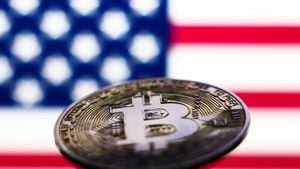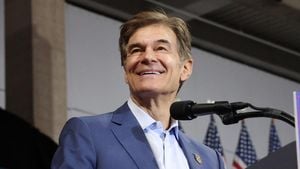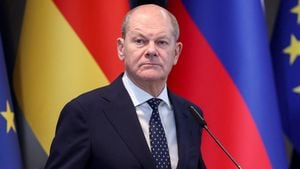Across the retail sector, worries are mounting as companies brace for the ripple effects of proposed tariffs from the Trump administration. Walmart's Chief Financial Officer, John David Rainey, recently highlighted the potential for price hikes on certain goods if these tariffs are implemented. This warning is part of broader concerns from various retail leaders about how these tax increases on imports could exacerbate inflation and strain American consumers.
Rainey made it clear during his interview with CNBC, stating, "We never want to raise prices. Our model is everyday low prices. But there probably will be cases where prices will go up for consumers." The uncertainty surrounding which products may be affected remains, but it's evident from his remarks and those of other retail executives, such as Lowe's CFO Brandon Sink, who mentioned up to 40% of their merchandise costs stem from imports, indicating significant exposure to tariff impacts.
Trump's proposed tariff policy includes imposing duties ranging from 10% to 20% on all imports, with staggering levies as high as 60% to 100% on goods from China. Consumers and retailers alike are feeling the heat as experts warn of price increases and other ramifications stemming from this drastic policy shift. The National Retail Federation's CEO, Matthew Shay, even labeled the impending across-the-board tariffs as "a tax on American families," insisting these surcharges would lead directly to inflation, price rises, and potentially job losses.
Despite the impending changes, Rainey pointed out some reassuring notes about Walmart's operations, indicating around two-thirds of the products they sell are domestically produced. He emphasized the company’s experience with tariffs, having navigated similar environments under previous administrations, and remarked, "We've been living under a tariff environment for seven years, so we're pretty familiar with these challenges." Nonetheless, he acknowledged the inflationary nature of such taxes, stressing the need to partner with suppliers to lower prices where possible.
Inside the retail corporation, reactions varied from cautious optimism to rational concerns. Lowe's CEO Marvin Ellison expressed similar worries, mentioning their proactive strategies to manage higher costs, already engaging suppliers to discuss possible scenarios stemming from the tariff plans. Ellison remarked, "We're not waiting to act. We've got plans and scenarios and are trying to understand the future implications of these tariffs."
While some retailers may be prepared to adjust and adapt, smaller companies and those heavily reliant on imports from China could face dire consequences. Footwear brand Steve Madden, for example, has started to curtail its imports from the country by up to 45% over the coming year to dull the potential impact from tariffs. Similar sentiments were echoed by E.l.f. Beauty's CEO, who indicated they might also need to increase product prices if the new tariff regulations come to pass.
The discussion around tariffs isn’t just about consumer prices; it's about predicting how these economic policies might reshape both retail strategies and consumer behavior going forward. Economists warn the cascading effects of these tariffs could lead to substantial economic deceleration, as seen through reports from financial institutions like Morgan Stanley, which predict significant growth reductions through 2026 under the tariff scenario.
This complex situation raises important questions about the long-term effects of price inflation and economic health as these policies gradually roll out. The multifaceted and interconnected nature of retail, import dependency, and consumer behavior paints quite the picture of uncertainty amid shifting economic policies.
Another layer to this financial puzzle is people’s changing attitudes toward spending. Inflation has stabilized somewhat recently after ramping up for several years, leading some consumers to be more discerning about their purchases. Retailers must navigate this tricky terrain, balancing price adjustments with consumer sentiment, as shoppers might recoil at the thought of paying more for everyday items.
Analysis of the current economy indicates we might be on the brink of substantial shifts, regardless of whether the tariffs are implemented. Business leaders are left to ponder how best to react to these changes and whether they can shield their companies from the potential market downturn.
Retail dynamics have always been sensitive to external shifts, be they economic, sociopolitical, or environmental. The proposed tariffs add yet another layer of complexity to this already volatile environment, affecting not just pricing, but also sourcing strategies, consumer choices, and overall market stability.
Consumers have begun to voice their opinions, with many expressing concerns over rising prices. Some have taken to social media to share their thoughts on the matter, emphasizing the need for transparency from companies about how these tariffs might affect them at the checkout. The growing sentiment among consumers echoes the concerns of industry leaders, placing the onus on retailers to find ways to maintain their price promises without sacrificing quality or access.
A look back at historical trends shows this isn’t unprecedented; times of economic uncertainty have often led to bursts of inflation, especially when tariffs are introduced. Companies like Walmart and Lowe's have reiterated their commitment to keeping prices low even against the looming tariff threat, but whether consumers will experience sticker shock remains to be seen.
Overall, the confluence of proposed tariffs, retail strategies, consumers’ inflationary concerns, and broader economic forecasts create a compelling narrative of uncertainty. The question remains: how will the economic policies proposed by the Trump administration shape the future of retail and consumer behavior? A careful watch on price trends and corporate responses will be required from all stakeholders as we navigate this potentially tumultuous terrain.



